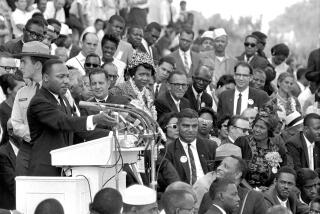Muslims Ponder Postwar Iraq
- Share via
With Saddam Hussein’s whereabouts no longer in question following his highly publicized capture, hundreds of Muslim Americans spent Saturday pondering another puzzle: How will democracy take shape in postwar Iraq?
The topic was one of more than a dozen up for discussion at the annual convention of the Muslim Public Affairs Council, which promotes the idea of an American Muslim identity. The weekend conference, “Progressive Islamic Thought and Human Rights,” was expected to draw more than 1,500 people to the Long Beach Convention Center.
“American Muslims have a lot to say and a lot to offer, but we must free ourselves from these cultural biases that come from the Middle East and South Asia,” said Salam Al-Marayati, the group’s executive director.
Scheduled workshops included the growing Muslim vote, women’s struggles and religious extremism. Hundreds of people attended a workshop on Iraq beyond Saddam Hussein.
Speaker Ali Tulbah, an associate director in the White House Office of Cabinet Affairs, expressed optimism about Iraq’s future. Tulbah, who returned last month from a six-month stint in Iraq, recounted a recent walk through Baghdad to illustrate the change that has swept the country. He recalled strolling past an Internet cafe that provided students with computer access, an apartment building covered with satellite dishes and a television crew documenting the news.
“There were measurable results left and right,” Tulbah said.
Another speaker, Jafar Al-Qazwini, assistant director of the Assadiq Foundation who returned last week from a visit to Iraq, said as many as 160 newspapers, magazines and periodicals have been established in Iraq.
“As chaotic as it looks,” Al-Qazwini said in an interview, “I’m optimistic about the future.”
Al-Qazwini warned, however, that more needs to be done to stabilize the security situation, or a lack thereof, in Iraq. He said recent history also provides lessons that everyone from Hussein sympathizers to the U.S. government to the people of Iraq could learn from. “The people of Iraq should not allow another dictator to rise again,” he said.
Maher Hathout, spokesman for the Islamic Center of Southern California and senior advisor of the Muslim Public Affairs Council, voiced similar concerns about the need to prevent a dictator from assuming power.
Tulbah drew grumbles from the audience when he responded to a question about what the response would be if the Iraqi people passed a referendum for the United States military to immediately leave their country.
“We don’t have any reason to believe that there is a groundswell for coalition forces to leave immediately,” Tulbah said. “People are waiting for the democratic process to take root.”
More to Read
Sign up for Essential California
The most important California stories and recommendations in your inbox every morning.
You may occasionally receive promotional content from the Los Angeles Times.













